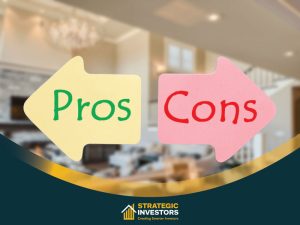
When it comes to investing in real estate, investing with a group of people share many similarities with investing in property as an individual.
Both are different types of personal financial structures available to you as a property portfolio investor.
For the purpose of this article, investing in property as a group is defined as real estate investment with two or more people.
There are many ways to get started with investing in property as a group
 Investing with a spouse, trusted friend(s) and joining an investment group are popular ways to leverage skills, experience, and resources (time and money) when it comes to real estate investment.
Investing with a spouse, trusted friend(s) and joining an investment group are popular ways to leverage skills, experience, and resources (time and money) when it comes to real estate investment.
Experienced property investors use real estate investment groups to diversify their property investments. Beginners who want to take the first step onto the property ladder can quickly learn how to invest in property with little money!
There are three main types of investing in property as a group
Why should I consider a trust, company, or SMSF instead of buying an investment property?” is one of the most common questions asked in the real estate investment industry. Here are some of the most compelling factors to consider when searching for an answer to this strategically important question:
Joint Property Investment Structure
This is when two people decide to invest in property together. Usually, a spouse, partner, trusted friend, or colleague. The pros and cons are very similar to investing as an individual, but usually with twice the resources (double the time, money, and borrowing capacity).
Important things to consider when investing in real estate as a joint personal financial structure:
 When considering joint property investment, you need to be aware of the distinction between joint tenants and tenants in common. Joint tenants refer to property ownership which all parties involved have an interest.
When considering joint property investment, you need to be aware of the distinction between joint tenants and tenants in common. Joint tenants refer to property ownership which all parties involved have an interest.
One of the most important aspects of it is the Right of Ownership. This term refers to the fact that should one party pass away, the property ownership will be automatically transferred to the surviving partner.
On the other hand, tenants in common refer to co-ownership, and in this case, none of the parties have the Right of Ownership. Should one of the partners pass away, their share of the property would be transferred to their estate, not to the surviving partner.
Partnership Property Investment Structure
 Investing in property as a partnership is a type of real estate investment group that is usually made up of at least three people. This type of legal entity is essentially are a larger version of a joint property investment structure.
Investing in property as a partnership is a type of real estate investment group that is usually made up of at least three people. This type of legal entity is essentially are a larger version of a joint property investment structure.
Real Estate Investment Groups (REIGs)
 Getting started in property investment on your own can be a bit daunting, not to mention expensive. You will have to deal with many different things, such as taxes, maintenance, and rent. All these expenses can scare investors away.
Getting started in property investment on your own can be a bit daunting, not to mention expensive. You will have to deal with many different things, such as taxes, maintenance, and rent. All these expenses can scare investors away.
Investing through a real estate investment group is an excellent way to learn how to invest in property with little money. This is because REIGs are often an established (and bigger) version of partnership property investment structures. Real estate investors, especially beginners (and the time-poor property investor), have access to a pool of experienced property investors they can leverage and learn from.
There are many synonyms for REIGs, the most common of which are:
- Real estate syndicates.
- Real estate investment clubs.
- Property syndicates.
Real Estate Investment Groups (REIGs)
 Every REIG is different, and you must choose one that aligns with your needs. The one thing they all have in common is that investors pool their money to invest, make a return, and the profits are split among the group.
Every REIG is different, and you must choose one that aligns with your needs. The one thing they all have in common is that investors pool their money to invest, make a return, and the profits are split among the group.
It is also important to remember that real estate syndicates, real estate investment clubs, and property syndicates are often used when you are researching this topic. As you build your team of experts along your property portfolio investment journey, it is important to choose advisors who are knowledgeable on the world of real estate investment, including the choice of legal entity you choose to invest in property with.
Due diligence is crucial when investing in a REIG. Perform a thorough background check on the manager(s) and members before you make your decision. You have to ensure the REIG you choose to invest with aligns with your needs and is transparent about how investments are held, the management and ownership structures and percentages, etc.
Investing in property as a group comes with many advantages
Compliance requirements and setup costs of real estate investment groups are usually a lot lower than those of more complex legal entities, like companies or trusts. This is especially true for partnerships with a lower number of property owners.
If a loan is involved, negative gearing is also an option. However, complexities in administering negative gearing increase with the group size. The property investment group is also eligible for the 50% CGT discount if the group has owned the property for over a year.

Investing with larger numbers also creates economies of scale. It opens you up to property investment opportunities you would not have had access to had you invested as an individual. For example, you have access to more capital than you’d have on your own. Investing in real estate as a group also allows you to seek out partners with more real estate experience than you. This often leads to a reduction in workload, time, and energy investment when it comes to the management of a property portfolio.
Additionally, investment groups can help further your education. They meet regularly to learn more and improve strategies. These meetings might include speakers, and members can also attend conferences at a discount. This is especially true for larger real estate investment groups like REIGs.
Find out your borrow capacity
Investing in property as a group comes with many advantages
 The need to avoid conflict between partners is one of the sources of drawbacks when investing with partners. A formal agreement needs to be made regarding ongoing property costs. This agreement must define who will be liable for what costs and specific percentages. These percentages are also important when it comes to income distribution. For positively geared investments, income will be taxed at the marginal tax rates for all partners (according to their individual rates). There is almost no room for tax-efficient income distribution when investing in real estate as a group because the income is fixed according to the ownership percentages.
The need to avoid conflict between partners is one of the sources of drawbacks when investing with partners. A formal agreement needs to be made regarding ongoing property costs. This agreement must define who will be liable for what costs and specific percentages. These percentages are also important when it comes to income distribution. For positively geared investments, income will be taxed at the marginal tax rates for all partners (according to their individual rates). There is almost no room for tax-efficient income distribution when investing in real estate as a group because the income is fixed according to the ownership percentages.
The need for an agreement also creates a level of inflexibility and affects both decision-making and liquidity. For example, when there is a need to increase investment contributions. Another example is when it comes to the need to sell/liquidate a property. Consensus is required in accordance with the property group investment agreements before decisions are made.
There is also limited asset protection in property investment groups. Each owner is liable for the property in proportion to their ownership percentages because they are the direct owners in accordance with the partnership agreement.
Weighing up the pros and cons of investing in property as a group
 Using the Strategic Investors Personal Financing Structure scorecard, we assess the merits of investing in real estate as partners. Remember, our assessment is aimed at a general audience. It is always essential to seek professional advice when formulating your own strategy. Another factor to remember is that our scores for property investing using this type of legal entity are the average of the entire spectrum, from joint property investment to the largest property syndicates.
Using the Strategic Investors Personal Financing Structure scorecard, we assess the merits of investing in real estate as partners. Remember, our assessment is aimed at a general audience. It is always essential to seek professional advice when formulating your own strategy. Another factor to remember is that our scores for property investing using this type of legal entity are the average of the entire spectrum, from joint property investment to the largest property syndicates.
- Leverage: Investing in property as a group is one of the best ways to leverage time and money. With proper due diligence and the right set of agreements, forming a real estate investment group is one of the most leveraged ways of investing in property. The larger the group of investors in the property investment group, the higher the leverage. Our general advice score: 9/10 for Leverage.
- Compliance: The level of compliance of property group investing is relatively low compared to other personal financing structures. This is especially true for fewer partners investing in property using this category of legal entity. Our general advice score: 8/10 for Compliance.
- Setup Costs: Because there is a high correlation between the level of compliance required between various legal entities and setup costs, our general advice score would be similar to the compliance score. However, setup costs in terms of time and money may increase for larger investment groups, especially for property syndicates. Our general advice score for Setup Costs: 7/10 for Setup Costs.
- Asset Protection: Investing in property as a group offers a low level of asset protection. All partners are legally liable for the property in proportion to their ownership. Whilst the risk is spread across a larger number of property owners, this is counterbalanced by the risk that a real estate partner is sued, thus exposing their share of the property to risk. This causes complications due to the liquidity nature of property investment, especially when investing in a group. Our general advice score: 2/10 for Asset Protection.
- Property Taxes: Much like investing in property as an individual, the tax benefits tend to outweigh the tax disadvantages. Do bear in mind, though, that there is a greater level of administrative burden to correctly allocate income and expenses correctly between partners. Our general advice score: 7/10 for Tax.
- Liquidity and Flexibility: The largest hurdle for property investors who choose to invest with partners is that significant decisions, like selling, adding value, or deciding on larger maintenance requirements, requires consensus from all partners before action is taken. Our general advice score: 4/10 for Liquidity and Flexibility.
- Wealth Transfer: In terms of wealth transfer, investing in property as a group shares many similarities with investing in property as an individual. There is the added complexity of other partners. It is for this reason that our wealth transfer score is lower for property investing as a group. Our general advice score is 4/10 for Wealth Transfer.
Weighing up the pros and cons of investing in property as a group
 It is always important to remind ourselves that every property investor has different sets of personal circumstances and different goals and aspirations. With this in mind, we provide our general advice verdict on investing in property as a group. Our average general advice score for investing in property as a group is 6/10.
It is always important to remind ourselves that every property investor has different sets of personal circumstances and different goals and aspirations. With this in mind, we provide our general advice verdict on investing in property as a group. Our average general advice score for investing in property as a group is 6/10.
As is customary to our articles in this series about property investing through the use of various legal entities available to you, we conclude the article with some closing remarks for real estate investors with different levels of investment property experience.
Verdict for property investors who are beginners
Investing in property as a group is one of the best ways to expand the number of property investment options available to you. With the leverage (both time, money, and expertise) available to you as a partner to a property investment group, combined with the relatively low levels of compliance, setup costs, and advantageous tax benefits such as negative gearing and CGT on property discounts, our general advice score for this group of investors gets a bump up to 9/10.
Verdict for property investors who are experts
We’ve talked about the need for asset protection as your property portfolio investment journey grows. Like investing in property as an individual, the need for asset protection and wealth transfer becomes more critical. With more experience, there will also be less reliance on other partners for knowledge and experience. In fact, there may be an increased burden/expectation for the experienced investor to help with the management and administration of the property group. Our general advice score for this group of investors is 3/10.













